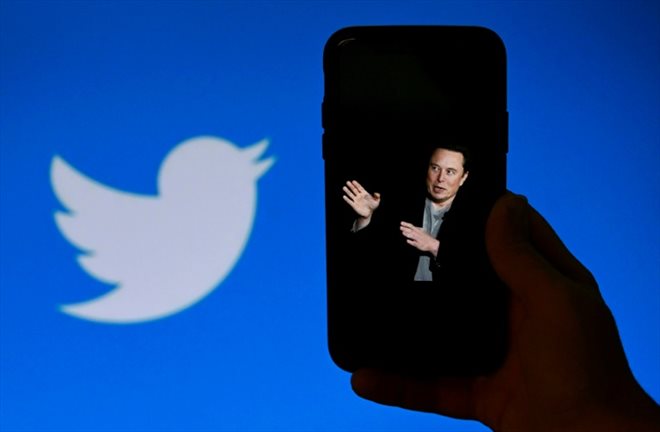Twitter headquarters in San Francisco, California on November 4, 2022 (AFP/Samantha Laurey)
Elon Musk’s decision to take Twitter out of the stock market should allow him to make major changes quickly, but this has required the company to be heavily indebted, a risky choice for a company that is not profitable.
The practice is old and has had some famous precedents, from computer maker Dell (a success) to Toys”R”Us toy stores (a failure), but the example of Twitter “is very different from a classic takeover “with delisting, said Steve Kaplan, professor at the University of Chicago.
Most of these takeovers relate to companies that make money, explains the academic, while the social network loses it.
Twitter’s activity was thus clearly in deficit during the first two quarters of 2022.
The equation has been further complicated by the loans taken out by Elon Musk, in the amount of 13 billion dollars, which will have to be repaid not by the entrepreneur, but by the San Francisco company.
According to a calculation made by AFP, it will be necessary to disburse a little less than a billion dollars in the first year for interest and principal, a very high amount for a group whose turnover has not reached than five billion dollars in 2021.
“There is going to be a lot of pressure to reduce costs and increase revenues so that they can meet debt maturities,” warns Steve Kaplan. Otherwise, Elon Musk will have to hand over the wallet, as the main shareholder, to avoid bankruptcy.
On Friday, the entrepreneur got rid of about half of Twitter’s employees. It is also looking for new sources of income, in particular by soon offering users the possibility of subscribing to a paid subscription at eight dollars per month.
The development of the blue bird social network, as imagined by the boss of Tesla and SpaceX, should require significant investment and probably new money, more difficult to raise, in theory, by an unlisted company.
“I don’t think he can borrow more,” said Erik Gordon, a professor at the University of Michigan’s Ross School of Business. “The only way is to raise capital. Ordinarily it would be very difficult. (…) But there is a Musk factor. You do a few tweets and the money rolls in.”
– Protected from Wall Street –
Another major difference in the acquisition of Twitter, “most transactions of this type are initiated with financial or industrial reasoning”, while Elon Musk “did not have any”, he argues.
“He was just unhappy with the way Twitter was handling the issue of freedom of expression and thought the company was mismanaged and he could do better,” says Erik Gordon.

Elon Musk, new leader of Twitter, plans to thank about 50% of the approximately 7,500 employees (AFP/Archives/OLIVIER DOULIERY)
Delisting is usually followed by “radical changes” for the company concerned, recalls Sreedhar Bharath, a professor at Arizona State University, often out of sight as the company no longer has obligation to communicate publicly.
“Society is protected from punishment by financial markets if they don’t like the changes,” he said. Wall Street “sometimes focuses excessively on quarterly results”, whereas with an unlisted company, “executives can prioritize long-term objectives, without short-term fallout.”
“But with the visibility of Twitter, important decisions will filter” and largely maintain the group in the public space, tempers Jagadeesh Sivadasan, professor at the University of Michigan. “It has already been verified for the first decisions made after the acquisition.”
According to a study published in 2019 by two researchers from California Polytechnic University and which looked at nearly 500 transactions between 1980 and 2006, around 20% of large companies subject to a leveraged buyout (LBO) file for bankruptcy within 10 years. , against 2% for a sample of other companies.
“Most are doing better than listed companies,” says Erik Gordon, “but you don’t hear much about them. It’s the big failures that get all the attention and create this idea that debt is killing businesses. .”
“Most often it works, which is why people keep doing it,” he insists.
“Musk is one of the most creative people in the world,” capable of building three totally different companies, PayPal, Tesla and SpaceX, all of which have reached over $100 billion in valuation, says Steve Kaplan. “And he’s going to attract (to Twitter) real talent that there hasn’t been for a while. (…) I wouldn’t bet against him.”
© 2022 AFP
Did you like this article ? Share it with your friends with the buttons below.




